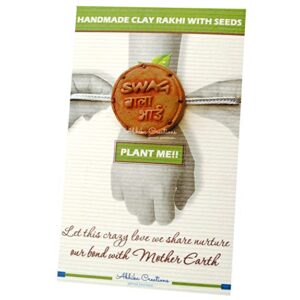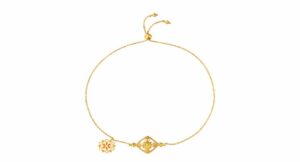Sustainable, cultural and mythological symbols of love

Taruna Sharma
With sustainability being the key word these days, and various brands across different verticals going in for environment-friendly products for festivals, how can Rakhi be left untouched? One cannot rule out the fact that pandemic is one of the reasons behind this growing consciousness towards environment.
Sajke, a Vadodara-based sustainable brand that makes handcrafted, contemporary outfits with zero waste products, has come up with “vedic rakhis” that contain turmeric, chandan, rai and kesar in them. Some of its Rakhis have mustard seeds in them. Its Rakhi gift hamper comprises a plant-growing kit containing a biodegradable pot, spinach seeds, coir for mud and an organic fertiliser.
Rakhi kit by Sajke
Ba No Batwo, the Aurangabad-based brand has come up with gender-neutral plantable rakhis. It has also launched an online campaign #MeriBehanMeriTakat. Its rakhis are not just handcrafted, but are made from clay and infused with seeds like Karanj (Millettia Pinnata) and Golden Shower tree (Cassia Fistula). Natural products like turmeric, rice paste, and geru are used to colour the threads. Even the packing is done using upcycled clothes and coconut husk.

The rakhi kit of Bengaluru’s Seed Paper India comes with one plantable seed (tulsi) rakhi, coco peat/organic fertiliser, coco pot planter, and an instruction card. The kit comes in a packet made from recycled paper, and can germinate in 4-6 weeks.
Made from clay, rakhis by Abhika Creations contain special seeds of Vinca Rosea, a plant which blooms twice a year. Its rakhi kit contains a biodegradable pot, a packet of soil, and an instruction manual. Rakhis are packed in butter paper and kept inside a corrugated box. Instead of using cello tape, which is made from plastic, they seal the box with paper tape.
Jewellery brand Tanishq’s exclusive Rakhi collection is inspired by cultural & mythological symbols and motifs that are believed to be the most powerful symbols of protection, hope and good fortunes. The charms on the Rakhis are representatives of the sun & the lotus, both of which are believed to be auspicious and harbingers of good luck.
The brand has also launched an exclusive collection of Lumba Rakhis as well.
“For our new Rakhi collection, we look back into our mythologies and explore symbols and motifs that from time immemorial are believed to be the most powerful symbols of protection, hope, and good fortune. Nothing can be more reassuring in these difficult times than a powerful talismanic Rakhi tied with love,” says Abhishek Rastogi, Head of Design, Jewellery Division, Titan Company Limited.
“Originated in Rajasthan, a Lumba stands for a ‘bangle’. On Raksha Bandhan, it is a customary tradition amongst the Marwari families, wherein the sister ties a Lumba rakhi on a sister-in-law’s bangle. A Lumba Rakhi is tied on the hand to receive protection for the whole family. Besides, it helps strengthen the emotional bond between a sister and a sister-in-law, sealed with a dangling Lumba rakhi,” he adds.






